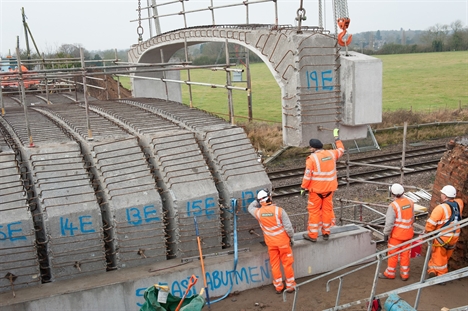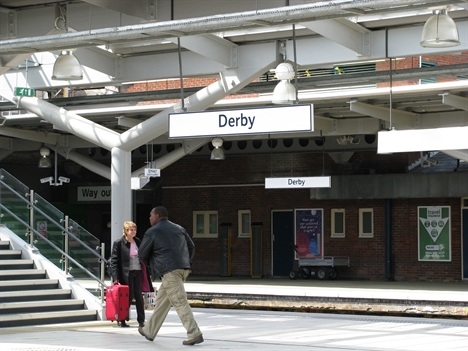08.09.15
East Midlands hints that HS2 support depends on MML electrification
Business and council leaders in the East Midlands will urge government ministers and local MPs to prioritise electrification of the Midland Main Line (MML) over other ‘paused’ rail upgrade schemes currently on hold.
They have hinted that their support for HS2 is also dependent on the government’s backing of MML electrification, arguing in a letter to transport secretary Patrick McLoughlin: “Electrification is a key element in…regional support for HS2”.
The delegation will ask regional MPs for support at a meeting at the House of Commons on Wednesday next week (16 September), ahead of a final 4 November meeting with McLoughlin and new Network Rail chair Sir Peter Hendy.
Part of the arguments put forward in the joint letter to McLoughlin include the fact that the “considerable” investment and effort already put into preparing for the MML electrification makes it a “more certain proposition” than other ‘paused’ electrification schemes, such as the TransPennine route between Leeds and Manchester.

Above: Engineers rebuild Templars Way bridge in Bedfordshire, part of the preparatory works for MML electrification
This includes design work and rebuilding a number of bridges “to the point at which full implementation was about to commence”. Piling work between Bedford and Kettering began in May.
The letter said: “Not only is it important that the value of this investment is not lost, we understand that other proposed electrification projects have not been developed to the same level of readiness – nor indeed have a number of other major schemes in the previously agreed CP5 investment programme.”
Chris Hobson, director of policy at the East Midlands Chamber of Commerce, said: “Businesses in the East Midlands were disappointed and frustrated with the decision to pause the planned electrification of the MML and welcome the opportunity to meet with the transport secretary and chairman of Network Rail to discuss why this project should take priority over other schemes in Network Rail’s future plans.
“For the past two decades, there has been huge investment in other routes, yet the MML has been starved of investment, in spite of the fact that the route serves one of the fastest-growing areas in England, which has generated much of the economic growth needed to drive the UK’s economy away from recession and created more jobs than any other region.
“The electrification of the MML is critical to the delivery of a modern, cost-effective and reliable transport system serving the economy of the East Midlands and should proceed without delay.”

Chair of the D2N2 Local Enterprise Partnership, Peter Richardson, also argued that MML electrification is a “key part” of the necessary infrastructure to drive forward plans for the ‘Midlands Engine’ and support regional HS2 developments.
Cllr Jon Collins, chair of the East Midlands HS2 Strategic Board and vice chair of East Midlands Councils, reiterated the importance of the electrification project to the delivery of the ‘Midlands Engine’ initiative and to the long-term prosperity of local economies.
They will also claim that even a small delay on the electrification project could “significantly” increase costs, citing the escalated costs of the Crossrail project as an example.
Collins said: “All that further delay will do is increase costs and undermine business confidence in the government’s ability to deliver key infrastructure projects.”
Other points enclosed in the letter include the “difficulties” the project’s uncertain future creates for East Midlands Trains when procuring replacement rolling stock for its current fleet of diesel HSTs – which must be replaced by 2019 at the latest, according to the delegation.
Delaying the decision could “limit” available procurement choices and force a franchise holder to go with a diesel-only rolling stock, resulting in a “backward step” for the region’s low-carbon economy aspirations and reduced rail costs.
Furthermore they will claim that electrification informed how business and political leaders supported HS2’s regional connectivity plans and approached the development of a ‘Midlands Engine for Growth’ and ‘Midlands Connect’ initiative. Because of it, councils, local enterprise partnerships and businesses made “real strides” in building a consensus on these two fronts, especially in joint support for an HS2 hub station at Toton.
As a result, leaders want this effort to be taken into consideration as part of Sir Hendy’s review and McLoughlin’s decision.
The letter was jointly written and signed by Collins and Richardson, as well as by Liz Fothergill CBE (president of the Chamber), Cllr Martin Hill OBE (chair of the East Midlands councils and leader of Lincolnshire County Council), and Nick Pulley (chair of Leicester & Leicestershire LEP).
Leaders from Leicester, Derby City Council, Derbyshire County Council, Nottinghamshire County Council, Rutland County Council, Northamptonshire County Council, and Leicestershire County Council also informed and signed the document.
In August, councillors from all main parties on Nottinghamshire County Council urged the government in a letter to take advantage of the ‘paused’ MML £1.1bn electrification project to proceed with “cheaper” phase 2 track works.
The government had confirmed the ‘pause’ of the MML in June to allow struggling Network Rail to focus on the Great Western instead, which was classified as the “top priority”.
(Top image c. Alvey & Towers)
